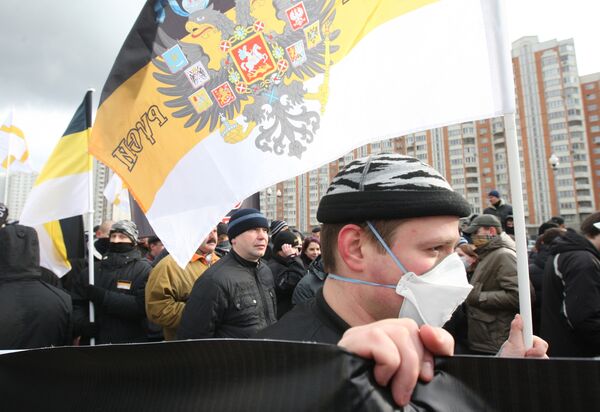A number of prominent Russian nationalists united on Thursday to announce the creation of a potential new political force – the National Democratic Party.
“We intend to file for party registration in the near future and then take part in elections, at which we are counting on doing well,” party leader Konstantin Krylov told journalists at a downtown Moscow news conference.
Russia has seen a dramatic rise in nationalist sentiments since the break-up of the Soviet Union, with far-right movements prominent at this winter’s mass protests against the policies of President-elect Vladimir Putin and his ruling United Russia party.
“The spirit of the times has changed and the wind is blowing in our sails,” said party executive committee head Vladimir Tor. He also said he was “100 percent” sure the party would not be denied registration.
“Russians must become the genuine masters of their own country – its land, its wealth and, most importantly – its government,” read a party manifesto distributed to journalists.
A Levada Center opinion poll carried out last December indicated that 69 percent of Russians agree to some extent or another with the nationalist slogan “Russia for Russians.” Another 62 percent supported the slogan “Stop Feeding the Caucasus!” a reference to generous Kremlin funding of the mainly Muslim North Caucasus, which includes Chechnya.
Tensions have been exacerbated by clashes in big cities like Moscow and St. Petersburg between ethnic Russians and youths from the North Caucasus, as well as by mass immigration from impoverished former Soviet Central Asian republics such as Tajikistan.
Racial violence led to the deaths of 21 people of “non-Slavic appearance” in 2011, a decline from 42 in 2010, according to the Sova organization, which monitors race-hate attacks in Russia.
Anti-corruption blogger and opposition figurehead Alexei Navalny has frequently expressed nationalist sentiments and attends the annual Russian March, organized in part by both Krylov and Tor. He has also been invited to join the National Democratic Party’s supervisory board.
“We are holding talks of a positive, constructive character with him,” Tor told RIA Novosti by telephone later on Thursday.
The party looks to bring together Krylov’s Russian Public Movement, Tor’s Movement Against Illegal Immigration, and the Russian Civil Union led by Anton Susov, as well as a number of other organizations.
Suits, no Skinheads
Dressed in sharp suits and ties, both Krylov and Tor were keen to stress the party’s distance from traditional images of skinheads and swastikas and highlight the “democratic” aspect of the party’s name.
“We want to create a classic, European national-democratic party,” Krylov said. “We share democratic values and believe democracy needs to be restored to Russia.”
“The Russian nationalist movement has been almost entirely cleansed of the so-called skinhead elements,” he said.
And analysts suggested the party’s prospects were good, if it gains registration.
“Nationalism is a political trend in demand whose ideas have been used even by Putin, who has called himself a ‘Russian nationalist,'” said analyst Alexei Mukhin of the Moscow-based Center for Political Information think tank. “The nationalist movement has been boosted by this.”
Putin has described himself as a nationalist on a number of occasions, and in January pledged in a pre-election article to crack down on “aggressive, provocative and disrespectful” internal migrants who fail to respect “the customs of the Russian people.”
But he also warned against the promotion of the idea of the creation of a “mono-ethnic, national Russian state,” calling it “the shortest path to both the destruction of the Russian people and Russia’s sovereignty.”
“Judging by Russia’s nationalist-orientated electorate, it’s natural that the possibility for such a party exists,” said analyst Lilia Shevtsova of the Moscow-based Carnegie Center. “But the success of the party will depend not only on the electorate, but also the authorities. The Ministry of Justice could disband the party at any time.”
Reforms on party registration has led experts to suggest a host of parties with similar names and aims could appear as soon as Medvedev approves the relaxing of regulations and it appears the National Democratic Party may face competition for the hearts and minds of the country’s nationalists.
“It will be good if there are lots of nationalist parties,” Dmitry Dyomushkin, the leader of Russia's outlawed Slavyansky Soyuz nationalist movement, told RIA Novosti by telephone. “That way it will be harder to fight against us.”
“I don’t mean any disrespect to our colleagues, but our party will be bigger,” he said.
Dyomushkin’s potential party has yet to settle on a name.
Feeding the Caucasus?
National Democratic Party leaders hit out at a number of occasions on Thursday at the Kremlin’s funding of the North Caucasus and proposed the region’s “golden thread” of financial support be cut off. Krylov said budget spending on average on residents of the North Caucasus was ten times higher than spending on ethnic citizens.
“North Caucasus people are perfectly capable people, who are able to work,” said Krylov. “It’s insulting to them to even suggest otherwise.”
But the head of the Russian Congress of Peoples of the Caucasus dismissed claims that the volatile region was being “overfed” by the Kremlin
“Nationalists just take these figures without examining them,” said Aliy Totorkulov. “A lot of the money supposedly bound for the Caucasus doesn’t end up there at all due to money-laundering.”
“You only have to visit the region to see how people live,” he said. “Many people can’t find work, that’s why they are forced to move to Moscow.”


